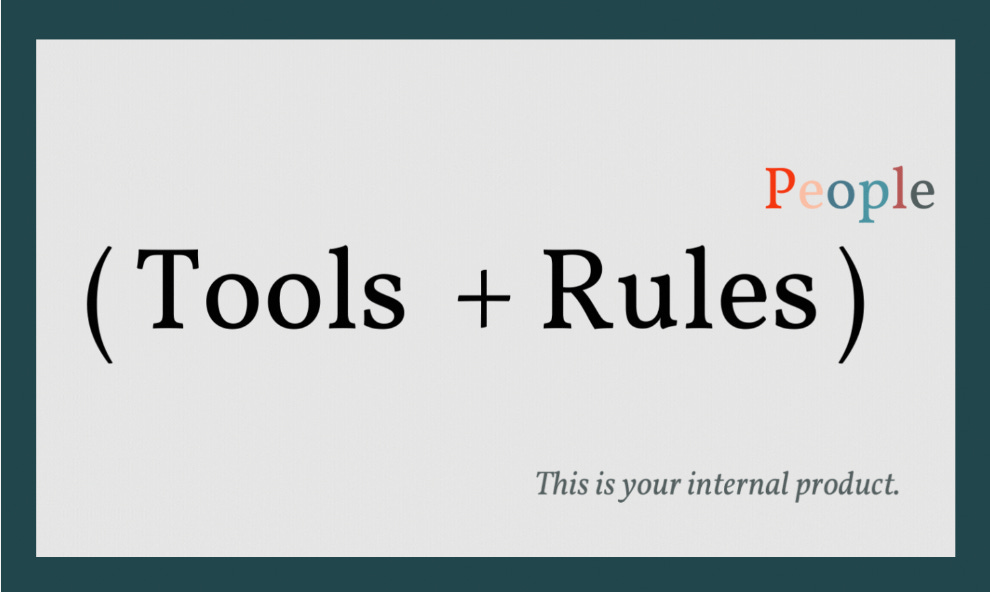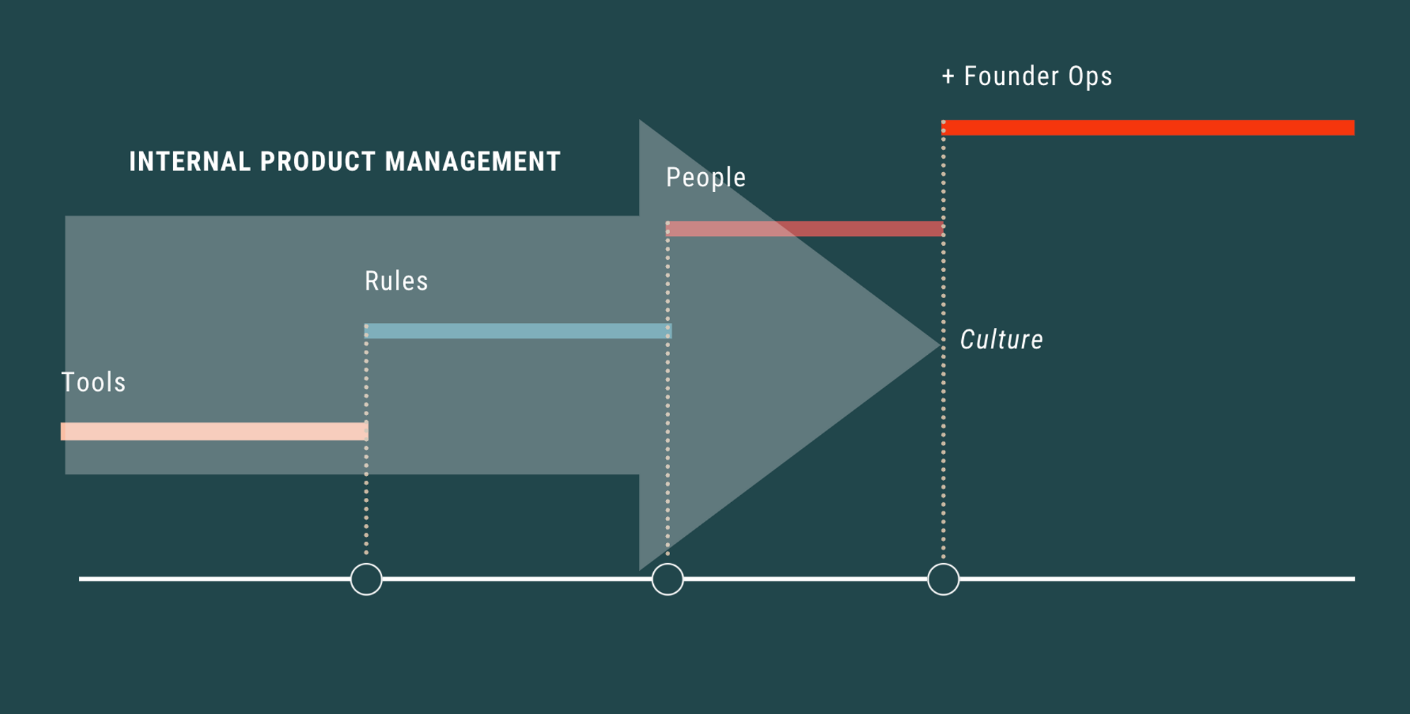What is internal product management for startups?
The magic behind loving the process of operating a startup lies in getting good at this. ⬆️
internal product management (noun) man·age·ment: IPM is the art and science of delivering business impact by coordinating tools, processes, and people to work cohesively together so that the whole is greater than the sum of its parts.
Building a strong internal product is the foundation for scale. Post-idea-stage startups succeed because they’ve taken their “why” and crafted a clear “how,” and the best ones do it by using behavioral science and product management methodology to create their internal product.
What does this mean? Consider the role of a product manager, who is responsible for “delivering business impact by marshaling the resources of your team to identify and solve the most impactful customer problems.” If you consider your business to be your product, the role of an internal product manager is to help those on the team (people) drive business impact by managing (building processes) the resources (their tools and time) to solve their biggest bottlenecks to operate more efficiently, effectively, and, hopefully, happily.
Skilled generalists are expert internal product managers.
They use the fundamental principles of behavioral science most often used by product leaders building customer-facing products to create ideal operating systems and working environments for scaling startups.
Layer on what you’re using to do the work (tools) with what’s being done (process) and have that be managed by behaviors, motivations, and ideas (people) and you get your internal product.
how DO you utilize your tools, build processes, and support people to design a system for your startup to thrive?
Treat your business like a product.
Why This Works
Build products that solve a problem for customers = grow a startup.
Empower the people solving the problems for customers to work better = grow a startup.
Your tools, processes, and people are your inputs. When working well together, they will impact your output, i.e. your ability to build and grow a startup that works.
Why Do This Now
How we do what we do is changing – rapidly, and seemingly at the speed of AI.
But – there are basic inputs to any great operating system, and if you thoughtfully consider all, you'll find that the care you put into your internal product is just as beneficial in driving speed and scale as the care you put into your external product.
The quicker you set the outline of a structure that allows for important work to shine through, the more likely it is that you’ll be working deeply on hard problems, reducing your efforts around shallow work, and getting closer to transforming your startup into everything you dream it to be.
how We Do: Intentionally design systems for the tools, processes, and people to operate in sync.
We’ll highlight some key areas of consideration in each of these internal product management sections to help you think like an expert internal product manager.
Tools 🛠️
The tools you choose impact every part of your external product, and in many ways become your key working environment. How you use your day-to-day tools has an outsized impact on your team’s ability to work cohesively, collaboratively, and expertly to solve problems.
Tools can come in all shapes and sizes, including:
Communication management (i.e. Slack, Teams)
Knowledge management (i.e. Notion, Coda)
Work management (i.e. Asana, Monday.com)
Functional operations management (i.e. Salesforce, Hubspot, Justworks, etc.)
Some key questions that internal product managers consider when choosing and using tools are:
What is the goal of this tool? Am I using this to achieve my goal, or is this a half-baked attempt to solve my problem?
How does this tool solve a specific problem that I am facing? Is it needed or nice to have?
Are we sacrificing too much to rely on factory settings? Or can we customize enough to fit the way our team works best?
Is it compatible with our existing tools? What are the cross-functional capabilities of the tool?
Is the tool scalable operationally and financially?
Who needs access to the tool, and how will each individual use this?
How do you build good habits in using a tool that sticks with teams?
Rules (Process) 📝
While the “move fast and break things” startup methodology is polarizing, it’s hard to ignore the fact that speed reduces startup risk. If you can create team-wide processes to manage your operations and experimentation, you can increase startup velocity. The faster you work, the greater your chance of startup survival.
As AI continues to optimize the work that we do, we can start to rely on its use to create processes that reduce variance in a system to produce the same results. “Rules” are simply constraints on how best use internal systems, which define and set the tone for your internal OS.
Internal product managers are comprehensive in approach when building, managing, and iterating on processes (think: birthday party rules). The process is essential, but too much limits teams. It’s really about the art of a Goldilocks-esque process – just enough to make the team feel supported and aligned with others without being held back from doing work that matters in the way that works best for them.
People 🫶
As you see above, the formulas for internal product management aren't tools + process + people = IMP. Rather, your people exponentially reflect what tools you choose and the processes you keep. Meaning, humans have layers and are variable — in a good way — and considering how your team works, their behaviors, beliefs, and motivations will take you from operator to internal product manager.
Some key questions that internal product managers consider when thinking through people are:
How does this person work before I add any structure or process to their work? How can we build a system that feels as natural as possible for them, while considering the work of others?
How does this person communicate? Are they quick on their feet or do they need time to reflect on the topic or issue at hand before they’ll be comfortable sharing their ideas?
What is this person’s ambition within this startup? Are they early in their career and focused on widening experience or have they identified a focus area and are aiming to go deeper? Are they hoping to grow with your startup long term to be a key source of historic knowledge and perspective?
What energizes this person? Collaborating with other people, solving new and complicated problems, hitting stretch KPIs?
Take It Up A Level
What’s exciting about the opportunity to lead with an internal product management mindset is not only that you can increase team cohesion and speed of learning and growth, but that you’re unintentionally building your culture. Being an internal product manager means designing how it feels to do work. You’re developing a strong muscle without trying. Your culture starts to regulate its heartbeat. You’ll build startups of significance like the pros.
The byproduct of your internal product is your culture. And once you're a startup of more than one person, you have a culture that affects your ability to grow. This work fundamentally builds your culture, system by system.
And then, the magic happens.
Culture creates process without rules.
Things are working smoother, faster, and better. You’ve embedded internal product management as a core operating tenant in your startup, and things start to work well.
Actually Actionable
Nice article. Now what?
In the weeks to follow, we’ll be digging deeper into what it means to get smart at selecting and leveraging tools effectively, creating processes that enhance the work the team is doing, and supporting people in a modern way that builds the culture of high-performing doers that drives success in ways you couldn’t have predicted. In the meantime, the action to take from this is to consider what it means to be intentional about this work. Make space in your day over the next week to ask yourself these questions –
What does it mean to me to slow down to speed up?
Who can focus on internal product management within my existing team? Is it me as the founder, or is there a cross-functional generalist who can make an impact?
What is the current state of internal product management within my startup? How are we really working? Are people happy? Are we achieving what we’re hoping to achieve? Are we getting in our own way?
Can we take a step back and consider carving out space to build systems that will help us scale? How can we be visionaries and see the long game?
Dedicating time to your internal product will necessitate reflection. Are you the right person to lead this work? Or do you need an expert generalist who has the right skills to take the reins? Regardless, embracing an internal product manager mindset will pave the way for success both internally and externally.
Writer: Britt






